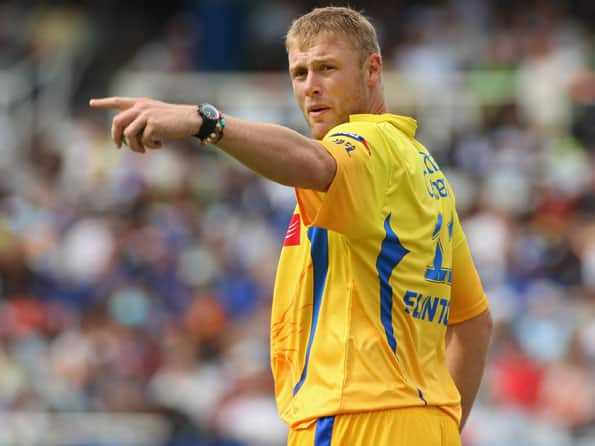Lalit Modi’s revelations: The next quake in Indian cricket?

“Flintoff auction was rigged… That onus was on me and as chairman I should have not allowed that to happen then. I was arm-twisted to allow Andrew Flintoff (above) to go to Chennai Super Kings,” says Lalit Modi.
By Madan Mohan
Lalit Modi, the former commissioner of the Indian Premier League (IPL), has alleged in an interview to television news channel CNN-IBN that the auction of English player Andrew Flintoff was rigged. He has claimed that he was “arm-twisted” into allowing Flintoff to stay with the Chennai Super Kings (CSK) team. He has also said that the retention clause for IPL franchisees was not his idea and that he had wanted to create a level playing field.
Before one draws any conclusions from his statement, one has to consider the circumstances in which he was ousted from the IPL in 2010 and the rather opportune timing of this statement. Perhaps, Indian cricket ought to be grateful to Modi for coming out with these startling revelations, but one wonders why he did not see fit to blow the whistle earlier. Did the Sahara group’s fallout with the Board of Control for Cricket in India (BCCI) present him an opportunity to settle scores with old foes? Or was he simply wary of going public with these details earlier?
That, incidentally, is also what BCCI chief N Srinivasan has asked when queried about these allegations. He said, “Modi is talking about 2009 auctions and this is 2012. If what he is saying is true, then why didn’t he speak out earlier?” Srinivasan goes on to state that there is absolutely no substance or truth in what Modi has said.
Will there be a rejoinder from Modi? Will a third party jump in the fray and unleash a fresh wave of revelations? Indian cricket certainly seems to be in a revelatory mood now, with each passing week bringing in its wake a fresh controversy.
At the moment, we are very much in the domain of allegations. Allegations that, I repeat, Srinivasan has vehemently denied. But perception is reality in show business and to an extent cricket is show business in India. There is an urgent need to correct increasingly mixed perceptions about the IPL.
Modi has also openly hinted at the perception of conflict of interest in the functioning of the IPL, stating that “the rules have been changed to favour some powerful BCCI members”.
Incidentally, Sahara chief Subroto Roy refused to bite the bait when pressed on the same point in an interview to CNN-IBN. He, on the other hand, said Srinivasan distanced himself from the functioning of the IPL because he was involved in the operations of CSK. The subject of alleged conflict of interest arising from Srinivasan’s roles in both India Cements (the company that owns CSK) and BCCI is presently sub judice. So the last word has not been said yet on that issue.
While we are, as I said earlier, discussing allegations and not proven episodes here, one cannot help recall how the sordid saga of match-fixing in 2000 or, for that matter, the spot fixing scandal of 2010. There were first rumours and allegations, which were roundly rubbished. But then came the police investigations and life bans.
They say that there’s no smoke without fire. In the interest of Indian cricket, one hopes this is all smoke and no substance. For if there does turn to be truth in these revelations, it raises grave questions about the transparency, or lack thereof, of the functioning of the BCCI and the IPL.
In the match-fixing and spot-fixing episodes, guilty players were made examples out of, a handy symbol of punishment and action. But rigging, if found to have truly occurred, represents a much deeper rot in the administration of cricket and one that may be much harder to remedy.
As I write, I can also predict the likely outcome. Srinivasan has already rubbish Modi’s allegations. Maybe the BCCI will give the news channel a headache for sometime as well. With that, the matter will be buried and life will go on.
Or, will it? Unlike the administrators and even, I dare say, the players, spectators have a purely emotional relationship with the game. They have not been paid to watch; on the other hand they pay to watch because they love the game. And spectator sentiment cannot be so easily rigged in favour of the game, once lost. Many fans swore never to watch cricket again when the match-fixing saga broke out. It shook the foundations of cricket like an earthquake and its scars haven’t yet healed. How many fans will the latest earthquake claim?
(Madan Mohan is 26-year old chartered accountant from Mumbai. The writing bug bit him when he was eight and to date, he has not been cured of it. He loves music, cricket, tennis and cinema and writing on cricket is like the icing on the cake. He also writes a blog if he is not feeling too lazy at http://rothrocks.wordpress.com/)